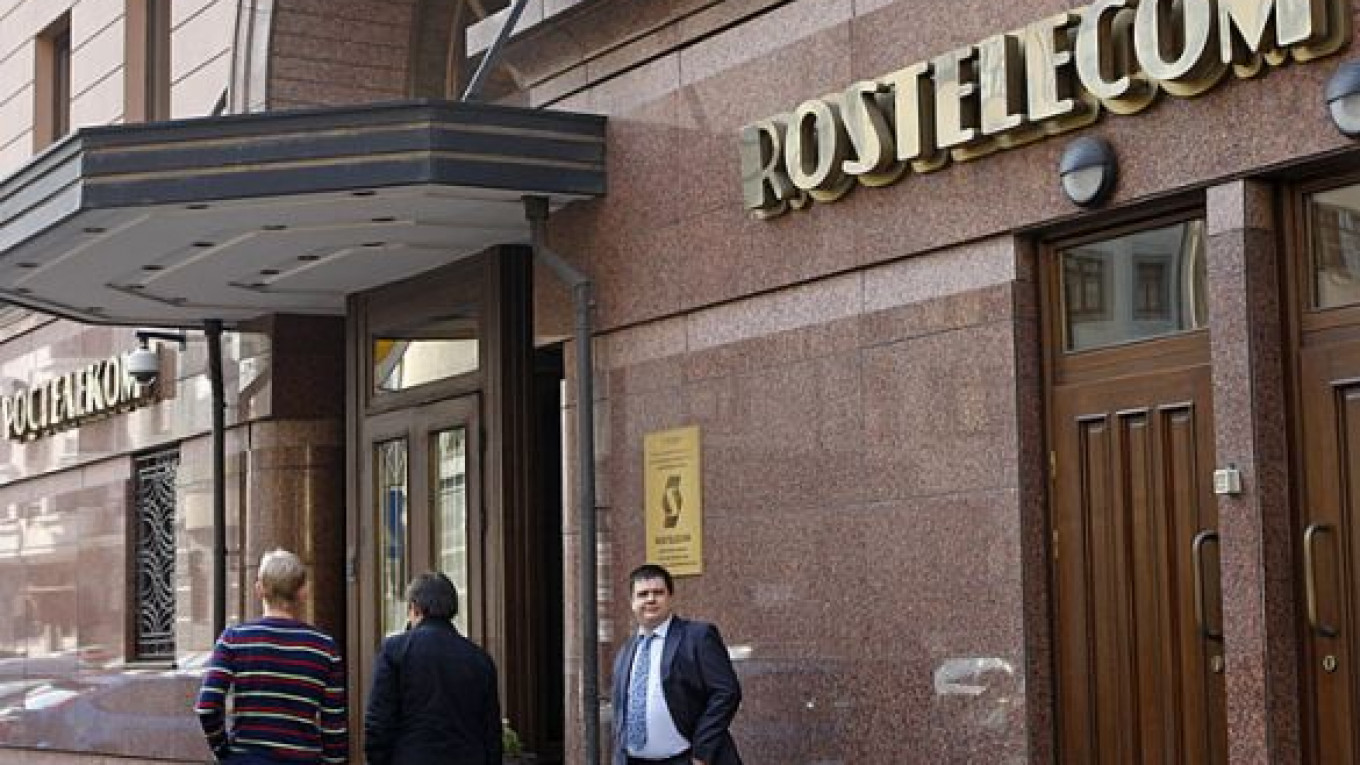National operator Rostelecom might list in London by the end of this year and is considering purchasing foreign assets as part of its development strategy, company president Alexander Provorotov said at a news conference Tuesday marking the legal completion of its merger with Svyazinvest.
The merger of Rostelecom and the holding company for all state regional telecommunications assets began in 2009, and has resulted in a company with 180,000 employees and $9 billion in combined sales.
Provorotov gave only a high level overview of what the company's priorities will be. "Key areas for us now are broadband access, paid television, and, if it works out, Skylink and its mobile broadband access, which means access networks will be a key area of investment," he said.
The newly formed giant plans to focus largely on Russia but does not exclude the possibility of looking elsewhere, should the opportunity emerge, Provorotov said.
Rostelecom's network now consists of 500,000 kilometers of cable throughout the country. Provorotov also said the operator will keep the Rostelecom brand name, which is more recognized than Svyazinvest.
Over the next four to five years the combined company plans to invest 20 percent of the revenues of in its own development, which could equal about $2 billion.
"Our goal is to have [broadband] access to the 35 million households we are [already] working with, and this will require substantial finances, which we will be able to provide in the coming years," Provorotov said.
The second key area of focus, Provorotov said, is the company's mobile business, with mobile Internet as the most important sector.
With penetration of traditional voice mobile services approaching 200 percent and little space left for competition, this is a good area for the merged company to focus on, he said. Last fall, Svyazinvest acquired Skylink, an operator that pioneered mobile Internet and is now part of the combined company.
While Rostelecom is not desperate for cash, Provorotov said, a listing on a foreign exchange could be the next step for the company.
Rostelecom, currently traded on MICEX and RTS, sees London as the most likely candidate.
The company is also pondering a potential purchase of assets abroad, especially in countries such as Belarus and Poland, where Rostelecom has well-developed relations, Provorotov told The Moscow Times.
He emphasized, however, that Rostelecom's priorities are domestic, and the company wants to maintain and grow its market share.
"We have a lot to do in Russia. Russia is very important for us, yet we do not exclude the possibility of going elsewhere should the opportunity present itself," he said.
As for the eventual role of what's left of Svyazinvest, its fate remains in the hands of the government, which is to decide on that aspect of the restructuring at a meeting in May.
Though many of the holding's specialists have already moved to Rostelecom, Svyazinvest chief executive Vadim Semyonov — who was in the same class as President Dmitry Medvedev in college and got his appointment in October following the abrupt resignation of Yevgeny Yurchenko — was quick to point out he is not disappearing.
"Do not rush to bury me just yet," Semyonov said.
Rostelecom also partly disclosed the new ownership structure where 43.37 percent of shares belong to Svyazinvest, 2.43 percent belong to VTB bank and 7.43 percent belong to the Deposit Insurance Agency.
Industry analysts are not satisfied that the new Rostelecom has presented a clear development strategy.
"For one thing, it's is not clear how the company will be developing its mobile assets," said Konstantin Belov, a telecoms analyst at UralSib. "We have heard that they bet on data, instead of voice, but there is no concrete strategy yet."
A Message from The Moscow Times:
Dear readers,
We are facing unprecedented challenges. Russia's Prosecutor General's Office has designated The Moscow Times as an "undesirable" organization, criminalizing our work and putting our staff at risk of prosecution. This follows our earlier unjust labeling as a "foreign agent."
These actions are direct attempts to silence independent journalism in Russia. The authorities claim our work "discredits the decisions of the Russian leadership." We see things differently: we strive to provide accurate, unbiased reporting on Russia.
We, the journalists of The Moscow Times, refuse to be silenced. But to continue our work, we need your help.
Your support, no matter how small, makes a world of difference. If you can, please support us monthly starting from just $2. It's quick to set up, and every contribution makes a significant impact.
By supporting The Moscow Times, you're defending open, independent journalism in the face of repression. Thank you for standing with us.
Remind me later.






